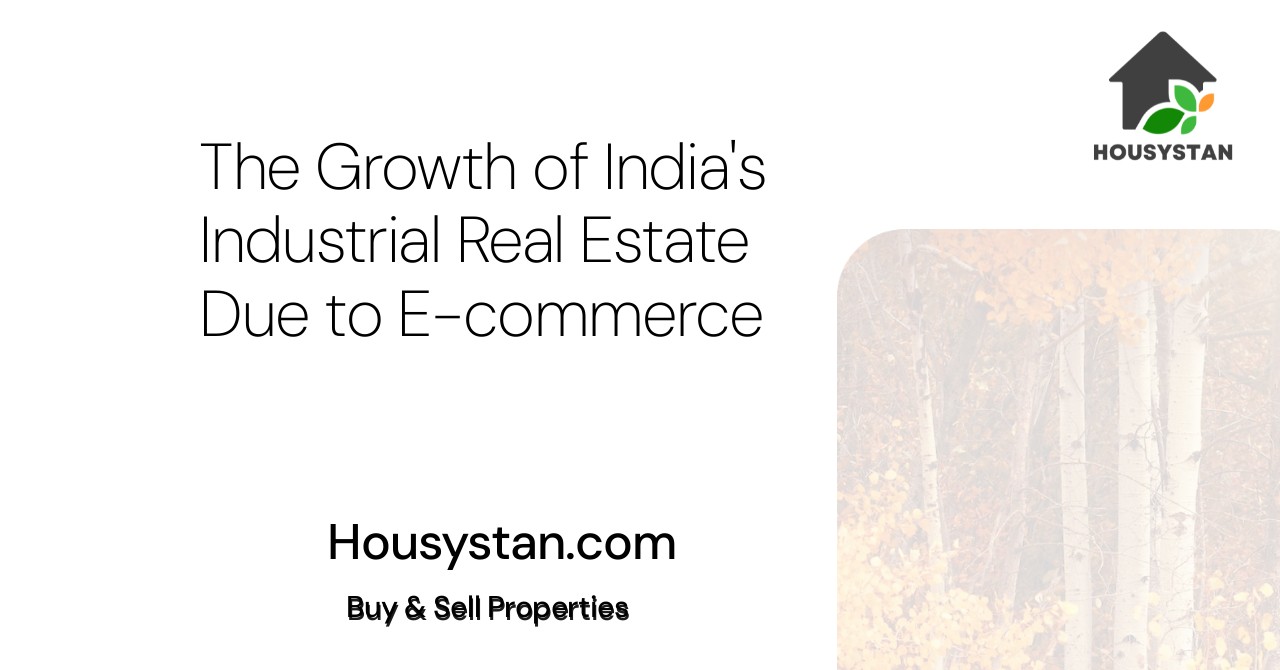The Growth of India's Industrial Real Estate Due to E-commerce
Read latest blogs and articles from Housystan

The Information mentioned here was last updated on:
29/1/2026The Growth of India's Industrial Real Estate Due to E-commerce
Introduction to India's Industrial Real Estate Boom
In recent years, India has witnessed a remarkable surge in its industrial real estate market, largely spurred by the meteoric rise of e-commerce. As online shopping becomes more embedded in the daily lives of millions of people, the demand for warehouses, fulfillment centers, and logistics hubs has skyrocketed. This boom in e-commerce has driven a parallel growth in industrial real estate, transforming the landscape in urban as well as peripheral areas.
- Verified Tenants/Buyers
- Unlimited Property Listing
- Zero subscription/charges fee
Understanding E-commerce's Influence on Real Estate
The Rise of Online Shopping
E-commerce platforms such as Amazon, Flipkart, and Myntra have revolutionized consumer behavior by offering unparalleled convenience and variety. With the proliferation of smartphones and internet access, even smaller towns and rural areas in India are now part of this digital shopping spree. As more consumers turn to online platforms for their purchasing needs, the need for efficient supply chain solutions has become critical.
From Order to Delivery: The Real Estate Connection
Behind every successful online order is a complex logistics framework that ensures items move from warehouses to consumers swiftly. To facilitate this process, e-commerce companies require vast spaces to store goods, sort them, and prepare them for delivery. This need has translated into a robust demand for industrial real estate facilities, including large warehouses strategically located near key transportation hubs.
Regional Hotspots for Industrial Real Estate Development
Growth in Urban Peripheries
Cities like Mumbai, Delhi, and Bangalore are witnessing a surge in industrial real estate development on their outskirts. These peripheries offer the dual advantage of proximity to major urban centers and relatively lower land costs. Developers are capitalizing on these benefits, constructing state-of-the-art logistics parks designed to cater to the needs of burgeoning e-commerce companies.
Emergence of New Logistics Hubs
Apart from established metropolitan areas, e-commerce expansion is also breathing new life into tier-2 and tier-3 cities. Regions such as Jaipur, Indore, and Coimbatore are seeing an influx of industrial real estate projects, thanks to their strategic locations and improved infrastructure. These cities offer a strategic advantage by connecting major trade routes and reducing delivery times to a vast consumer base.
Key Factors Driving Industrial Real Estate Development
Infrastructure Improvements
India's government has been focusing on enhancing infrastructure, which indirectly fuels the real estate boom. Improved roads, expressways, and thriving port facilities have made it easier for businesses to operate efficient supply chains across the country. Initiatives like the Bharatmala and Sagarmala projects aim to bolster connectivity, making remote locations more accessible for setting up logistics hubs.
Policy Reforms and Incentives
Policy interventions have provided a significant boost to the industrial real estate sector. The introduction of the Goods and Services Tax (GST) streamlined the movement of goods across states, encouraging businesses to consolidate logistics operations. Furthermore, incentives and ease of doing business offered by state governments have lured developers and investors to invest in industrial real estate.
Challenges Facing the Industrial Real Estate Market
Land Acquisition Hurdles
While the growth of industrial real estate is promising, acquiring land remains a thorny issue. The process can be complicated and time-consuming due to legal restrictions, compensation disputes, and local resistance. Developers often navigate these challenges by collaborating with local authorities and engaging in community relations to ensure smoother operations.
Environmental Concerns
As industrial zones expand, environmental considerations are becoming increasingly significant. Developers must ensure that new projects comply with environmental regulations, especially with regard to waste management, water usage, and emissions. Balancing industrial growth with environmental sustainability is crucial for long-term success.
Skilled Workforce Availability
Running a large-scale warehouse or logistics facility requires a skilled workforce. Training and retaining workers in specialized roles such as inventory management and automated systems operation is a challenge. Companies and local governments are investing in skill development programs to address this issue, ensuring that the workforce can meet the demands of modern industrial operations.
The Role of Technology in Shaping Industrial Real Estate
Automation and Smart Warehousing
Advanced technology is at the heart of modern industrial real estate. Companies are adopting automation and robotics to enhance efficiency and reduce operational costs. Smart warehouses equipped with IoT (Internet of Things) technologies enable real-time tracking of goods, predictive maintenance of equipment, and a seamless flow of information across the supply chain.
Big Data and Analytics
Big data and predictive analytics are revolutionizing supply chain management for e-commerce businesses. By analyzing consumer behavior and market trends, companies can make informed decisions regarding inventory management, transportation, and demand forecasting. This technological edge ensures optimized warehouse operations and reduces the risk of overstocking or stockouts.
Future Trends in Industrial Real Estate
Sustainable Development Practices
The integration of sustainability in industrial real estate will become more prevalent. Developers will focus on constructing green buildings that minimize environmental impact and reduce carbon footprints. The use of renewable energy sources and sustainable materials will not only meet regulatory requirements but also appeal to environmentally conscious investors and consumers.
Expanding Role of Regional Hubs
As India continues to urbanize, regional logistics hubs will play a crucial role in bridging the gap between metropolitan areas and remote regions. Investing in infrastructure and technology in these areas will allow e-commerce companies to reduce delivery times and costs, boosting consumer satisfaction. This strategic spread of industrial real estate is integral to supporting a rapidly growing digital economy.
With e-commerce steering the course, India's industrial real estate is on a trajectory of exponential growth. As these trends unfold, continuous adaptation to technological advances and a focus on sustainable development will be key to maintaining momentum in this booming sector. The transformation brought about by e-commerce will continue to shape India's industrial landscape, responding dynamically to the increasing demands of the digital age.